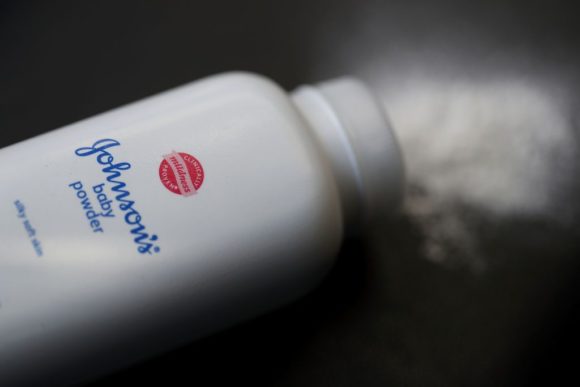A New Jersey appeals court’s decision to revive two lawsuits accusing Johnson & Johnson’s iconic Baby Powder of causing cancer may lead to the reinstatement of about 1,000 suits targeting the talc-based product.
A three-judge panel of the New Jersey Superior Court said Wednesday a trial judge erroneously threw out expert testimony backing up claims by two women that talc caused their ovarian cancers, clearing the cases for trial. The ruling could also affect other talc cases on hold before the same judge.
“There are approximately 1,000 ovarian cancer cases currently filed in New Jersey state court, with more to come,” Ted Meadows, one of the lawyers representing women bringing the baby powder cases, said in a statement. “This ruling paves the way for those cases to proceed to trial.”
That’s unwelcome news to J&J, which is headquartered in New Brunswick, New Jersey, and previously tried to transfer most talc litigation to the state in the belief that it might have a home-court advantage. Wednesday’s ruling and a New Jersey jury’s February award of $750 million in a talc case may help dispel that notion.
“We respect the court’s decision and are fully prepared to defend the safety of our product in court,” J&J spokeswoman Kim Montagnino said in an emailed statement. “We remain confident that our talc is safe, asbestos free, and does not cause cancer.”
Mounting Cases
J&J pulled Baby Powder off the market in the U.S. and Canada in May. The number of cases alleging it causes cancer continues to mount, though, increasing 15% over the last eight months, according to J&J securities filings. The company now faces more than 20,000 talc lawsuits, some claiming talc itself causes cancer and others pointing to alleged asbestos contamination in talc.
Holly Froum, a Bloomberg Intelligence analyst, said the growing number of cases may force J&J to pay as much as $10 billion to resolve the suits.
In Wednesday’s decision, the appellate panel found Atlantic County Judge Nelson Johnson was wrong to assess the credibility of plaintiffs’ experts Graham Colditz and Daniel Cramer in excluding their testimony, rather than scrutinizing the methodologies behind their conclusions that talc can cause ovarian cancer. Deciding credibility is an issue for the jury, not the judge, they said.
Imerys Talc America, a unit of Paris-based Imerys SA that mined talc used in J&J’s baby powder, also was named as a defendant in the cases. But it sought bankruptcy protection from creditors last year. The company is offering to settle more than 14,000 talc lawsuits by selling itself and other Imerys units as part of the bankruptcy and putting the proceeds into a trust for claimants.
Was this article valuable?
Here are more articles you may enjoy.


 Canceled FEMA Review Council Vote Leaves Flood Insurance Reforms in Limbo
Canceled FEMA Review Council Vote Leaves Flood Insurance Reforms in Limbo  These Five Technologies Increase The Risk of Cyber Claims
These Five Technologies Increase The Risk of Cyber Claims  US Will Test Infant Formula to See If Botulism Is Wider Risk
US Will Test Infant Formula to See If Botulism Is Wider Risk  Credit Suisse Nazi Probe Reveals Fresh SS Ties, Senator Says
Credit Suisse Nazi Probe Reveals Fresh SS Ties, Senator Says 